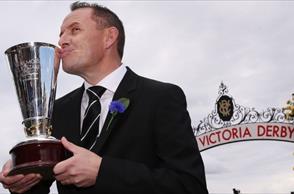
Chris Waller’s group 1 double at Flemington on Saturday has him on track to rewrite the record books in terms of group 1 wins in a season. And the indications are he could achieve a lot more, including a first Melbourne Cup victory on Tuesday.
The maiden Preferment’s Victoria Derby win was Waller’s 40th group 1 win and his seventh this season. The 40-year-old is on track to better Bart Cummings’ amazing season of 40 years ago. During the 1974-75 season, Cummings was all but unbeatable in the elite races, winning group 1s in five states. Over that year, he trained the winners of what today would be recognised as 19 group 1 races.
With a mighty armoury that included Think Big, Leilani, Lord Dudley, Leica Show and the sprinter Cap D’Antibes, Cummings’ wins that season included the Melbourne Cup, Caulfield Cup, Australian Cup and Newmarket Handicap, as well as derbies in WA and Queensland and the VRC Oaks.
With just three months of this season behind him, Waller has seven group 1 wins from seven horses. With nearly 50 group 1s left until the season’s end on July 31, the former Kiwi could reach Cummings’ remarkable figures, achieved when he was 46 and all but unstoppable.
The big difference, of course, could be Waller’s lack of success in the four recognised “majors” – the Caulfield Cup, Cox Plate, Melbourne Cup and autumn’s Golden Slipper Stakes in Sydney. That Waller will win one or more of these races several times over one day is not in dispute, butwhen will the wall come down and when it does, how will his rivals curb his likely dominance?
Although he is probably Australia’s biggest trainer of former international horses bought to race here, Waller has not forgotten his roots and Preferment’s win in the derby proved to him that New Zealand is still fertile ground for class staying horses.
Notably, while Waller is renowned for his talent with older international racehorses, his past three group 1 wins – Amicus in the Thousand Guineas, Brazen Beau in the Coolmore Stud Stakes and Preferment in the derby – were with three-year-olds on their way to stardom.
After the derby win Waller said that while the proven internationals had provided him with an arsenal for the major staying races, New Zealand horses offer two bites at lucrative cherries. They can be purchased early at the yearling or weanling stage and brought through the rich classic races as three-year-olds before being put on the cups trail as older horses, while tried international horses have already had their classics seasons in the northern hemisphere before coming here.
Waller’s three runners on Tuesday are a mix of international and Australasian. Junoob and Opinion are former European gallopers, Who Shot Thebarman is a Kiwi-bred Auckland Cup winner. Those credentials do not appeal as much as they did before the international horses put their stamp on the Melbourne Cup, but the Kiwis will win another Melbourne Cup soon enough and few New Zealand horses will go into the Cup with better staying credentials that this one,
Waller has been the leading group 1 trainer in Australia for the past two seasons and looks a certainty to notch a third next year, but it would be wrong to assume his statistics have improved since he first saddled a horse under his name almost 15 years ago.
During his training career, which began in 2000, Waller has saddled nearly 7800 runners for about 1100 winners, a 14 per cent win strike rate and a 40 per cent place strike rate.
In comparison, over the past 12 months, Waller has saddled 1580 runners for 221 winners for a win strike rate of 14 per cent and a place strike rate still running at 40 per cent. He is winning more races because he is training more horses and his horses are winning more money because they are winning better-quality races, but his pure runners-to-winners statistics have not budged and that is a credit to his horsemanship and management.
Waller had nine group 1 wins in 2012-13 and eight last season. He is certain to break new ground this season and likely to better the most recent runs of Gai Waterhouse, who won 11 group 1s in 2004-05 and 2006-07 and John Hawkes, who scored 12 elite race victories in 2002-03.
Source: Patrick Bartley, The Age